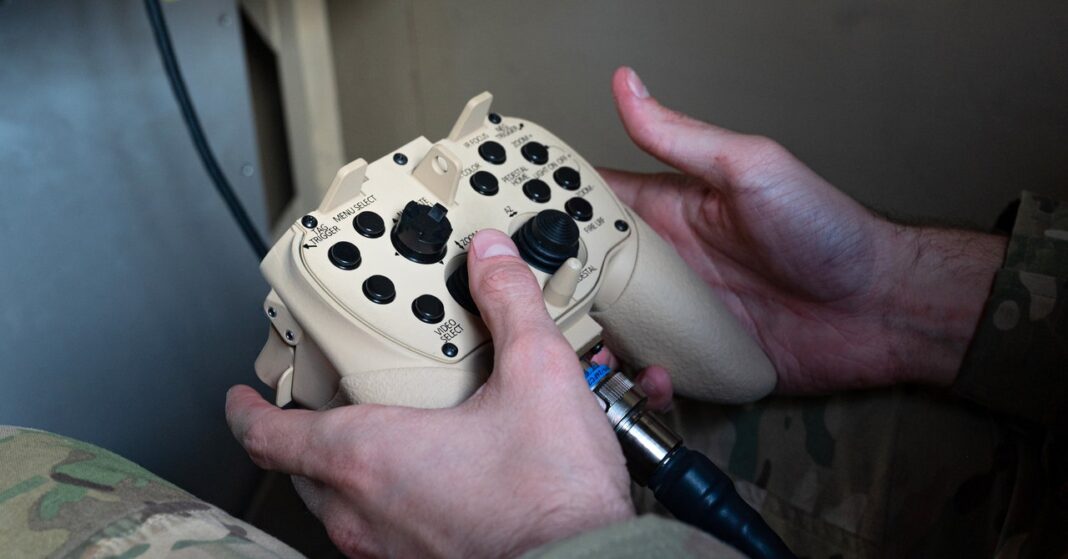In Short:
In future conflicts, American troops will control advanced weapons using gaming-style controllers similar to Xbox or PlayStation, rather than complex panels. The U.S. Defense Department has been integrating these controls, known as the Freedom of Movement Control Unit (FMCU), into various systems for the Navy, Army, and Air Force. This trend aims to create intuitive user interfaces familiar to younger service members, enhancing operational efficiency.
The future of warfare is set to evolve significantly, as American troops will increasingly operate advanced weaponry using controls reminiscent of popular gaming consoles such as the Xbox and PlayStation, rather than conventional control panels or touchscreens.
Integration of the FMCU
In recent years, the US Defense Department has been progressively integrating variants of the Freedom of Movement Control Unit (FMCU) as the primary control units for various advanced weapon systems. This information has been detailed in publicly available imagery shared on the department’s Defense Visual Information Distribution System media hub.
Advanced Weapon Systems Utilizing FMCU
These weapon systems include the new Navy Marine Corps Expeditionary Ship Interdiction System (NMESIS) launcher, which is designed to fire the new Naval Strike Missile. This system is pivotal to the Marine Corps’ strategy for potential future conflicts, particularly regarding tensions with China in the Indo-Pacific. Additionally, the Army’s Maneuver-Short Range Air Defense (M-SHORAD) system, which is armed with FIM-92 Stinger and AGM-114 Hellfire missiles, provides crucial anti-air capabilities in potential conflicts with Russia in Eastern Europe.
Moreover, the Air Force is utilizing the Recovery of Air Bases Denied by Ordnance (RADBO) truck, which employs lasers to eliminate unexploded ordnance. The Marine Corps is also testing the Humvee-mounted High Energy Laser-Expeditionary (HELEX) system.
Applications and Future Prospects
The FMCU has been adopted for a range of experimental unmanned vehicles, and as noted in a 2023 Navy contract, it will play a crucial role in operating the AN/SAY-3A Electro-Optic Sensor System, also known as “I-Stalker.” This system is expected to enhance the tracking and engagement capabilities of the upcoming Constellation-class guided-missile frigates.
Technological Background
Since its introduction in 2008 by Measurement Systems Inc. (MSI), a subsidiary of Ultra that focuses on human-machine interfaces, the FMCU has offered a design akin to that of standard gaming controllers, yet with a ruggedized structure to protect its sensitive components in challenging operational environments. MSI has established partnerships as a subcontractor for major defense firms like General Atomics, Boeing, Lockheed Martin, and BAE Systems to develop handheld control units for various aircraft and vehicle programs.
Industry Perspectives
According to Ultra, “With the foresight to recognize the form factor that would be most accessible to today’s warfighters, [Ultra] has continued to make the FMCU one of the most highly configurable and powerful controllers available today.” Despite multiple attempts for comment, the company has not responded to inquiries from WIRED.
The FMCU, while being a relatively new application for advanced weapon systems, has been in use since at least 2010 for operating platforms like the now-retired Navy’s MQ-8 Fire Scout and the Ground Based Operational Surveillance System (GBOSS), utilized by both the Army and Marine Corps during the global war on terror. The increasing adoption of this technology across sophisticated new weapons demonstrates a marked shift in the US military toward control systems that are not only ergonomic and intuitive but also familiar to the new generation of service members.





